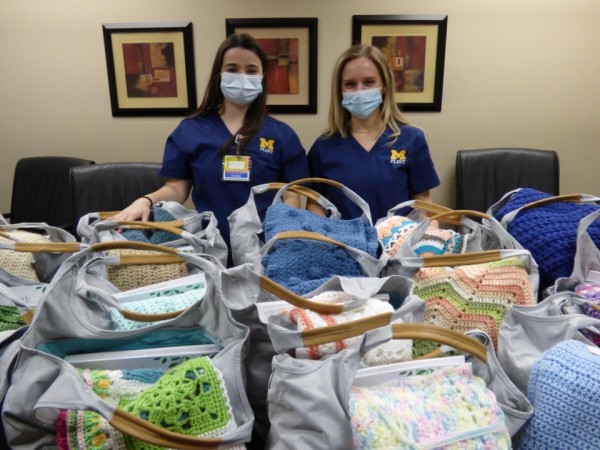Innovate 4 Change awardees fill a critical gap in community maternal health education
 In fall of 2021, the inaugural Innovate 4 Change event hosted by the U-M School of Nursing Student Innovation Ambassadors brought students from the U-M-Ann Arbor and U-M-Flint campuses together to develop innovative solutions to complex health care problems. The goal of the event was to highlight the knowledge, creativity and skill of student nurses in recognizing and solving health care problems, while learning to work with other disciplines as health care leaders.
In fall of 2021, the inaugural Innovate 4 Change event hosted by the U-M School of Nursing Student Innovation Ambassadors brought students from the U-M-Ann Arbor and U-M-Flint campuses together to develop innovative solutions to complex health care problems. The goal of the event was to highlight the knowledge, creativity and skill of student nurses in recognizing and solving health care problems, while learning to work with other disciplines as health care leaders.
Mother Nurture, one of the winning teams comprised of senior nursing students Jessica Carrasco and Brenna James from U-M–Flint saw a need to assist new mothers in their community. In 2019, the infant mortality rate in Flint was 10.8 per 1,000 live births compared to 6.4 in Michigan overall, while 85.5% of the births in Flint were covered by Medicaid.
Inspired by their belief that every mother and newborn deserves to be educated, cared for and supported despite differences in medical care, treatment, and awareness of and access to resources, Carrasco and James entered Innovate 4 Change and created Mother Nurture. The innovative three-pronged program allows nursing students to fill a critical gap in providing maternal health education at the bedside before discharge home, providing newborn supplies for a safer start at life and connecting new mothers with local community resources.
Utilizing prize winnings from the Johnson & Johnson Health Equity Award and support from the Health Care Professional Team from Pampers, Warm Up America!, U-M-Flint faculty and the U-M School of Nursing Healthcare Innovation Impact Program, Carrasco and James were able to compile supplies for new mothers and develop a 25-page tailored educational and resource guide to send home with new parents, in addition to other resources provided by Pampers. As part of the program, nursing students deliver the supplies and provide tailored education to mothers. Students who participate in this initiative earn community hours that can be used to fulfill their nursing degree requirements.
Carrasco and James piloted the project in early March.
“The moms we educated at the bedside felt this program was valuable due to the amount of one-on-one time that nursing students were able to dedicate and also because some of the materials we shared included information they did not have access to before,” James said of the feedback received. “They enjoyed that they would be taking our educational materials home to share with family members who would be supporting them and their new baby.”
Using insight garnered from the pilot, Carrasco and James hope to develop a program guide that could be shared with other nursing schools across the country where infant mortality rates are high to help educate new parents in safe baby care and provide families with needed essentials for a more solid start at life.





